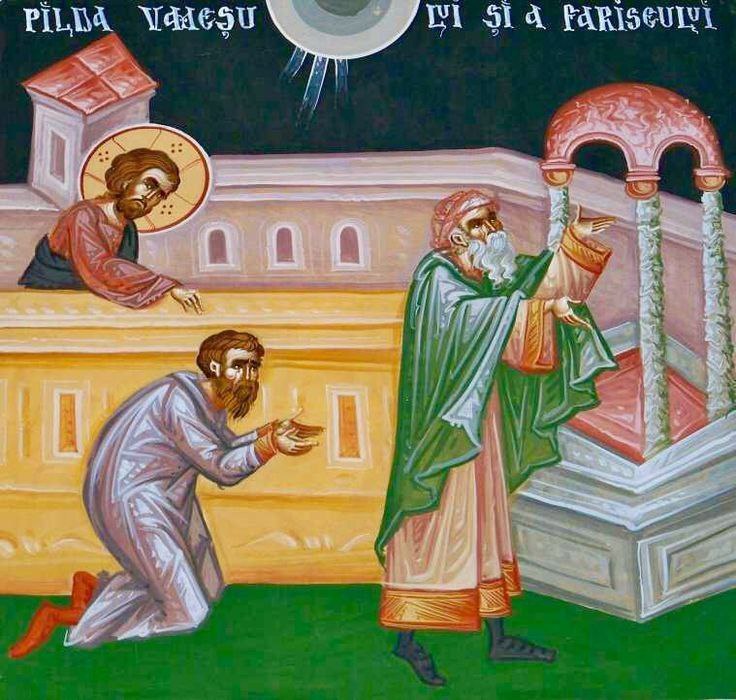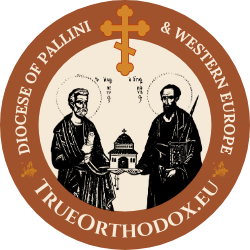The Mystery of True Prayer: “Lord, be merciful to me, a sinner”.

By RTOC Priest Aleksandar
…
Prayer is not just a word, nor is it merely a formal address to God.
It is an entry into the Holy of Holies, where the soul stands face to face with the living God.
True prayer is not uttered by the lips but burns in the fire of the heart; it is not a mere sound of words but the trembling of the soul before the Lord.
It is not adorned with eloquence but is stripped bare in its humility, filled with a deep awareness of its own unworthiness and a hunger for God’s mercy.
In the Gospel, the Lord reveals one of the deepest mysteries of spiritual life through the parable of the Pharisee and the Publican.
This is not merely a historical account of two men who once stood in the temple, but a mirror of every soul that approaches God. For before the throne of the Most High, there always stand two kinds of people: those who believe they are worthy and those who know they are not.
The Pharisee, a man of law and order, represents those who trust in their own righteousness. His prayer is not truly a prayer, but a self-dialogue, a conversation with his own pride. He stands before God not as a beggar seeking mercy, but as a judge who condemns others from the heights of his own virtue.
On the other hand, the Publican, the despised tax collector, does not come with a list of merits but with a heart shattered by repentance. He has nothing to offer except his weakness and tears. And precisely because of this, his prayer becomes a flame that lifts the soul to the throne of God.
This parable is not just a historical event, nor a lesson for a single people in a single time. It is the key that unlocks the door of salvation for each of us. For even today, in every church, before every icon, in every midnight prayer, two men stand: one who exalts himself and one who humbles himself. One who believes he is already saved, and another who knows that salvation is yet to be received.
Thus, the question arises: Who are we when we stand before the face of God?
Do we bow like the Publican, or do we stand upright like the Pharisee?
Do we knock on the door of mercy, or do we present God with a list of our virtues?
For one thing is certain: not everyone who enters the temple will leave justified.
Not every prayer will reach heaven. Only the one who prays in the humility of heart will be lifted up, while the one who stands in pride will be cast down.
This is the mystery of true prayer: not in what man utters, but in what his heart feels.
Not in the outward form, but in the inner truth. For God does not look at words but at the spirit, not at the body but at the soul, not at deeds in themselves but at the heart that offers them.
May this Gospel parable become a guide in our spiritual life, that we may not become judges of our neighbors, but tearful penitents before the Lord. For the one who knows his own nothingness has already taken the first step toward salvation.
Two men entered the temple: one with an exalted appearance, the other with a humbled heart. One clothed in the glory of the law, the other covered in the shadow of his sins. One lifted up by thoughts of his own righteousness, the other burdened by the knowledge of his own nothingness. Such is the image of the spiritual mystery given to us in this Gospel account—a mirror of the soul of every man who stands before the face of God.
The Pharisee stood in the temple, but not in the true temple of the heart. He lifted his voice, but not in a prayer of humility, rather in praise of himself. He stood within a building made by hands, but not within the mystery of a contrite spirit. His words were not sighs of the soul, but a hymn to his own deeds. He did not converse with God but with his own arrogance. He mentioned robbers, the unjust, adulterers—not as one who prays for the salvation of their souls, but as one who condemns them from the depths of his pride. His righteousness was not a light that illumines the world, but a heavy crown of pride that separated him from grace.
And the Publican—he did not enter the temple of legal ceremonies, but the temple of a heart crushed under the weight of sin. He dared not lift his eyes, for his soul was bowed under the burden of his transgressions. His posture was not merely physical, but spiritual—he stood far off not because walls divided him, but because he felt his own unworthiness. Yet precisely there, in the depth of his humility, he uttered words that lifted him higher than all the Pharisee’s deeds: “God, be merciful to me, a sinner!”
Oh, what a great mystery! The Pharisee believes he offers a sacrifice of praise, but in reality, he burns the incense of his pride. The Publican feels like an outcast before God, yet he is embraced in His mercy. For righteousness is not in a list of virtues, but in the mystery of a heart that knows its own nothingness. A man is not justified by his knowledge of the law, but by his awareness of his own weakness. He is not exalted by fasting twice a week or by giving tithes if his heart is not washed in the fire of repentance.
And thus, here is the spiritual law: “Whoever exalts himself will be humbled, and whoever humbles himself will be exalted.” Is this not a sword that divides the soul from the spirit, the fleshly from the grace-filled? Is this not the mystery of true ascent? Height is not in a title, a position, or visible glory, but in the depth of humble prayer. For a mitre does not save if pride reigns beneath it. A rank does not sanctify if the soul is not placed on the altar. Fasting and tithes do not save if the heart is not washed with the tears of repentance.
The Lord gave the Pharisee the law, but to the Publican, He gave mercy. For the law is given to humble man, not to exalt him. And when he holds to it without humility, it becomes a burden that separates him from God. But mercy—it seeks a broken heart, for only there does it find space to be poured out in fullness.
Does God look at the outward? No, for His Kingdom is not of this world. Priestly vestments do not justify a man, nor prayer ropes in the hands, nor long prayers on the streets. That which appears holy before men may be empty before God. For righteousness without love is like sounding brass, and fasting without repentance is like a sacrifice without blood.
Here, then, is the path. Whoever wants to enter the temple of Truth must enter like the Publican, not like the Pharisee. Whoever wishes to ascend must first descend into the depths of his repentance. Whoever seeks salvation must not inscribe his deeds on the tablets of pride but surrender them to God’s judgment in a spirit of contrition. For the true temple is not of stone, but of spirit, and into it do not enter those who consider themselves righteous, but those who know themselves to be sinners.
And not only will they be received, but they will shine with a light not of this world. For only the humble can bear the light of God without fear of being consumed. Only those who weep for their sins can understand the depth of mercy. Only those who see themselves as the last will be called to sit at the banquet of the Kingdom.
The Lord did not come for the righteous but for sinners. He did not come to praise the deeds of the law, but to call hearts to repentance. And whoever feels the weight of his transgressions should know that he is already on the path of salvation. For the first step toward God is the realization that without Him—we are nothing.
Are you ready to enter your heart and cleanse it of all impurity?
Many wish to see God, but are they ready to stand before Him?
For God does not look at the face but at the heart, and the heart of man is often like a neglected temple.
Let us pray, then, not as the Pharisee, but as the Publican: “Lord, be merciful to me, a sinner!”






Dear Father Aleksandar
Thank you for this explanation of the Pharisee andthe publican.
Glory to God!🙏🏻☦️